|

Armand Guillaumin
1841-1927
_______________________
You are an old man plodding along a narrow country road. You have been out since break of day and now it is evening. Sole sound in the silence your footfalls. Rather sole sounds for they vary from one to the next. You listen to each one and add it in your mind to the growing sum of those that went before. You halt with bowed head on the verge of the ditch and convert into yards. On the basis now of two steps per yard. So many since dawn to add to yesterday's. To yesteryear's. To yesteryears'. Days other than today and so akin. The giant tot in miles. In leagues. How often round the earth already. Halted too at your elbow these computations your father's shade. In his old tramping rags. Finally on side by side from nought anew.
-
Samuel Beckett, Company
_______________________
Culture Machine Vol 14 (2013)
Platform Politics
edited by Joss Hands, Greg Elmer and Ganaele Langlois
Introduction: Politics, Power and ‘platformativity
’Joss Hands
The Internet is vanishing: as its ubiquity increases, it has also become less and less visible in the production and experiences of network culture. Indeed, many of the operations that used to typify the Internet are now funnelled through so-called ‘platforms’. We do not have a single Internet anymore, but rather a multiplicity of distinct platforms, which in this issue are broadly defined as online ‘cloud’-based software modules that act as portals to diverse kinds of information, with nested applications that aggregate content, often generated by ‘users’ themselves. These are characteristics often associated with ‘Web 2.0’ in marketing and popular discourses; discourses that are wholly inadequate for a serious critical engagement with the politics of platforms. ‘Platform’ is a useful term because it is a broad enough category to capture a number of distinct phenomena, such as social networking, the shift from desktop to tablet computing, smart phone and ‘app’-based interfaces as well as the increasing dominance of centralised cloud-based computing. The term is also specific enough to indicate the capturing of digital life in an enclosed, commercialized and managed realm. As Eugenia Siapera points out in her article included in this issue, the roots of ‘platform studies’ in gaming and operating systems need to be extended to include digital platforms of all kinds. Therefore, while the presence of the Internet must not be forgotten, theories of network culture need to be supplemented with new frameworks and paradigms.
_______________________

Stoyan Tzanev
b. 28 February 1946
_______________________
Media Tropes Vol 4, No 1 (2013):
Deleuze / Foucault: A Neoliberal Diagram
Editorial Introduction: Neoliberal Diagrammatics and Digital Control
Matthew Tiessen, Greg Elmer
The objective of this special issue of MediaTropes - guest edited by Matthew Tiessen and Greg Elmer of the Infoscape Research Lab at Ryerson University - is to probe the edges and depths of what we call the “neoliberal diagram.” We define the neoliberal diagram as that panoply of factors that today constitute the relations of forces that pre-condition the range of potentials available to life in all its forms. This diagram is constituted by actors that include global governance institutions; national governments; international financial conglomerates (to whom, it is becoming clearer, governments are frequently obligated); globally surveilled Internet infrastructures; and corporations of worldwide reach, scope, and power. Through policy, projected military power, financial sleight-of-hand, and generalized public consent, power is consolidated in ways that are increasingly unavoidable and irrepressible
Tweets Speak: Indefinite Discipline in the Age of Twitter
Steven James May
Abstract
This article explains how three North American police services have extended technologies of discipline via the monitoring and use of Twitter during and between mega-events such as the 2010 Toronto G20 Summit. Taking as case studies the 2009 Pittsburgh G20 Summit, Toronto's G20 Summit in 2010, and the 2011 Occupy Wall Street protests in New York City, the Twitter-related arrests of activists at these mega-events reveal the ongoing work of maintaining indefinite discipline in North America. Furthermore, this articles shows that any citizen's decision to share, or not to share, information on Twitter (information otherwise often publicly available) at any time also falls within the scope of ongoing surveillance of Twitter, where users of the platform find themselves increasingly complicit in the work of their own discipline.
IPO 2.0: The Panopticon Goes Public
Greg Elmer
Abstract
To suggest that privacy is dead is not to revel in or encourage its demise, nor even to claim that it is not a desirable outcome, right, or valued policy. Rather, what this paper suggests is that in certain circumstances (increasingly on social media platforms) the privacy of users now stands in direct opposition to the stated goals and logic of the technology in question. One need not give up certain goals of privacy to recognize that business models of online companies like Facebook and Google are now entirely predicated upon the act of going public--there would be no Google search engine or Facebook social networking platform without the content, information, and demographic profiles uploaded, revised, updated, and shared by billions of users worldwide.
This paper then offers some initial thoughts on a theory of publicity, of going public in the social media age. If social media platforms are governed by ubiquitous surveillance and continuous uploading and sharing of personal information, opinions, habits, and routines, then privacy would seem only to be a hindrance to these processes. To ignore such clear mission statements, coupled with repetitive attempts to undermine, display, and obfuscate so-called privacy settings, would seem disingenuous at best, and willfully blind at worst. These online platforms profit from publicity and suffer from stringent privacy protocols--their whole raison d’être is to learn as much as possible about users in order to aggregate and then sell such profiled and clustered information to advertisers and marketers. Can we really conclude that such businesses violate users’ privacy when their platforms are in the first and last instance wired for ubiquitous publicity? Or more to the point, do privacy-based perspectives provide an adequate framework for understanding users’ relationships with social media platforms and their parent companies?
Monetary Mediations and the Overcoding of Potential: Nietzsche, Deleuze & Guattari and How the Affective Diagrammatics of Debt Have Gone GlobalMatthew Tiessen
Abstract
In this paper I focus on the affective dimension of debt and its primary mode of dissemination--privately and digitally created credit money. To do so, I examine the age-old--though increasingly visible--relationship between debtor and creditor, a relationship that today is (re)defining social, cultural, and political relations by (re)distributing power along a financially inflected debtor/creditor continuum. My aim is to focus not merely on the affectively charged nature of the creditor/debtor relationship, but to consider more closely the nonhuman agency or desire of credit-money itself. My suggestion is that contemporary credit-money can compellingly be understood as a sophisticated technology of dispossession and that today’s money-machine, which necessitates and gives rise to the infrastructure that supports it, affects the social landscape by pre-conditioning it, by opaquely overcoding the relationship between debtor and creditor on a grand scale (but also imperceptibly), until finally debt saturation, through the extension of credit, precipitates a credit crisis at which time all is revealed: that the creditor holds all the cards, that the debtor holds none, and no matter how much desire the debtor has to repay the exponentially compounding debts, the debtor’s future is, and will be forever, foreclosed by the promise to repay.
_______________________

William Degouve de Nuncques
_______________________
“Geographers say thereare two kinds of islands. This is valuable information for theimagination because it confirms what the imagination already knew.”
-
Deleuze
Philosophy and Desert Islands:The Great Escape: What We're Really Thinking About When Travel to a Desert Island
Isabel Löfgren (....)
“To dream of islands, whether with joy or in fear, is to dream of pulling away, of being already separate, far from any continent, of being lost and alone, or to dream of starting from scratch, recreating, beginning anew”, Deleuze continues.
To be in a desert island is to live in the idea of desertedness, to prolong its life of it being desert, empty. This doesn’t mean you have to bealone in it, though the shipwrecked always are (in literature, only uponlanding until the natives appear from the bushes), but perhaps you haveto understand the idea that maintains its image as being deserted. If you remember film The Beach , this is certainly the case. The presenceof a seemingly invisible, utopic community living on a desert islandtrying to create an alternate mode of living. As much as the boundariesof the island are absolute, so is the form of “government” that becomesnestled there. Can we go to a desert island and allow it to remaindeserted? Or is our sheer presence already a civilizing act? Can we go tothe island and resist making it our home?
(....)
_______________________

William Degouve de Nuncques
b. February 28, 1867
_______________________
Stultifera Navis (Ship of Fools)
Richard Hoffman
(....)
2.
In the broken city of bread under guard,
our motives remaining subject to revision,
we were modified and sentenced. Period.
We had the right to remain silenced.
We had the right to consider the lilies
in the florist’s window. Missionaries
and recruiters taught us history, left us
freedom to choose a god to petition
from the pull-down menu. We went right in,
sat down before a screen. In no time
we were finished and felt relieved.
We liked what we believed we saw.
Licking our sordid fortunes we were sent.
Portions of the future have been pre-recorded.
(....)
6.
We ferried our sullen sirens to the rocks and
handed them the music we composed so long ago
(of crooners’ modulated vowels sustained vibrato
and jingles for soap and beer that came to occupy
our parents’ minds) we had, already, forgotten.
We set the time when they would shed their ever
filthier silence, wired, a lyric bomb, and sing.
It wasn’t magic. Even our amnesia was strategic.
O land I love! I was born to your bright promise
and the hard terms of your peace. What I want’s
to be your one and only, take me in your arms
and gimme, baby. Gimme weregild of the slain
enslaved, the backpay of the disappeared, gemstones
someone’s bound to wear, it may as well be me.
...(more)
Richard Hoffman at the Poetry Foundation
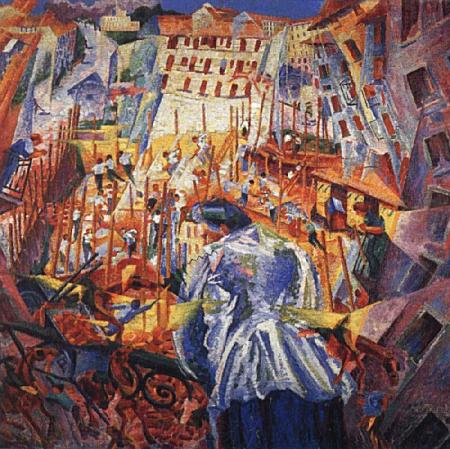
The Street Enters the House
1911
Umberto Boccioni
1882 - 1916
_______________________
Why Facebook’s WhatsApp Purchase Feels Like Cultural Imperialism
Navneet Alang
hazlitt
Is cultural imperialism the wrong phrase to describe Facebook’s purchase of WhatsApp? On the surface, it certainly sounds absurd. WhatsApp was, after all, yet another Silicon Valley company that was simply swallowed up by the Valley company par excellence. Typical Palo Alto incest, sure, but imperialism?
Yet, it was the term that leapt to mind as soon as I heard the news. Like millions of people, my family, a diaspora scattered across the globe, uses WhatsApp to stay in touch despite the immense geographic distances that separate us. Now that a company like Facebook owns it, it feels a bit like your favourite band selling out. Even if, in truth, there never really was any pure state to begin with, it still feels odd that a thing that was an intimate part of your life has now been sucked up into the contemporary emblem of the evil empire.
But if we felt a similar kind of “death of indie” with the purchases of Flickr, Instagram, and others, WhatsApp is unique in that its explosive growth has come in large part because of people, like my family, who are from what we tend to refer to as “emerging markets.” If WhatsApp is ostensibly just one more American company buying another, the optics are different because the user base is full of non-Western, non-white people. Just because it isn’t imperialism per se, it doesn’t mean it can’t give off uncomfortable echoes of it.
...(more)
_______________________
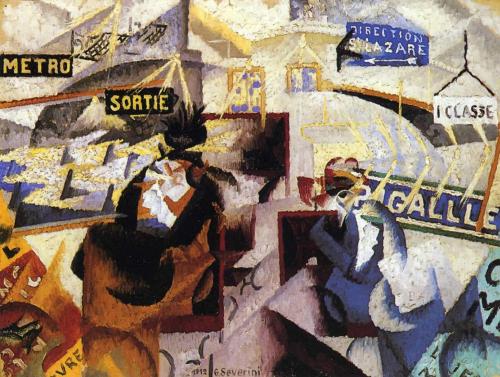 The north-south
Gino Severini
d. February 26, 1966
_______________________
From "Mozart's Third Brain"
Göran Sonnevi
Translated by Rika Lesser
LXXX
Dance is born out of the deepest interior of our bodies As if the light there
were streaming out, out of each body part's smallest movement
We hear gasping breaths We behold mouths open in trance
Out of them light also issues, in the whirling darkness
The stone falls through millennia The clear water's darkness
deeper and deeper But the vanishing is only apparent The
construction of enormity grows and grows In its transparency
Pain's nadir, deeper and deeper At its zenith
Identification with pain, annihilation of pain, is impossible
And yet it's there Like the entrance into darkness
May I touch your darkness? I would so like to
Forms of power move in the invisible Even
the anti-empire has power, I understand Together
we have the power to sublate power, I im-
agined once Even if only within ourselves
But there is no way to place oneself outside Night has no limit
It is toward infinity I want to go Unimaginably
What takes place in this thinking substance? The play of the mind's
faculties, the dance, across the inner, shimmering surfaces
For me there was no limit For me there is no
limit, except at the instant of snapping, even were it
endlessly stretched We will meet in the silence, after the dance
What does the voice communicate? As if I never knew
in advance It comes with all its potentials
Invisible Out of its fold, foldings, a face peers
as if it were Harlequin-Mozart The great darkness of the eyes! Also
their smile Quick, friendly We can be like that too
My vision is now given to the Eye-Brain Yours, you who
look at me, out of your femininity, half turned away, almost with
your back to me So that we will not burn up? I hear
your voice It exists in the vast play of the voices, their light
What kind of movement up from death? Is such a thing possible at all?
A flame rises from the ashes, dances, offers itself, its body
in its moments of stillness, a prayer Coiling into itself
Unwinding again Returning to the ruins of silence
...(more)
_______________________
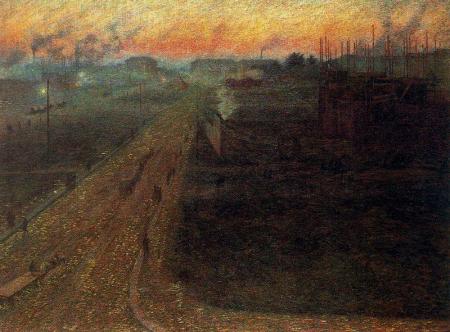
Twilight
Umberto Boccioni
1909
_______________________
What comes after real subsumption?
Jodi Dean
(....)
It seems to me like we actually get something like "after real subsumption" when we see capital flight and abandonment, environmental desolation, even capital's investment in class maintenance rather than production (stock buybacks, executive compensation, speculative finance, charitable foundations). There are moments of localized capitalist breakdown which the system routes around, often doubling in on itself in the process. Over the last several hundred years, capital has been able to destroy much of what it has accumulated and begin again. These cycles have a limit point, a point where what's been destroyed creates such waste that it's no longer worth trying to do anything with it. Capital would just rather leave -- abandoned buildings, towns, cities, regions, continents.
For now, I'll call this phase after real subsumption "absolute subsumption." Capital goes through itself and turns into an execrable remainder, the non-capitalizable, that which is completely without use or value. It can't be exchanged. In fact, it stains, corrupts, or damages whatever it touches -- like nuclear waste. It is utterly bereft of potentiality. Rather than being completely after real subsumption, absolute subsumption emerges within it over time.
In this inversion of capital into its opposite, the opposite of capital isn't labor, it's the non-capitalizable remainder that lacks potential. Does this lack imply that absolute subsumption is without people or that it's a condition in which people find themselves? It could be that proletariat is an appropriate name for the people of absolute subsumption.
...(more)
_______________________
Silent Salute of Poetry
Ryoichi Wago
Translated by Koichiro Yamauchi and Steve Redford
the floor
(....)
Running like the wind across the springtime countryside and mountain fields. Because the plants, the flowers are sprouting, budding, the thin tips of twigs are inviting the season. Feeling the breathing of storm, light, and clouds. Beethoven’s 9th Symphony is resounding. I’m a speeding conductor.
What’s a silent salute? What’s a silent salute of poetry? Whizzing over the mountain fields, over the countryside, across the bottom of the blue sky, my mind turns furiously. What’s the meaning of a silent salute? What does it mean for poetry to salute silently? The storm, the light and the clouds. A break in the clouds. A deer’s cry.
What does the bridge try to connect from this shore to that shore? What does the bridge try to convey from this shore to that shore? What does the bridge try to bring from that shore to this shore? Crossing a bridge, crossing a bridge…
Chasing the light. Chasing the wolf-shaped light. Chasing the wind-shaped light. Chasing the road-shaped light. Chasing the light shaped like you. The light shaped like the heart is dazzling. Chasing the light shaped like paddies and fields. Chasing the world-shaped light. Embracing (in my arms) the prayer-shaped light. The spring blue sky.
...(more)
_______________________
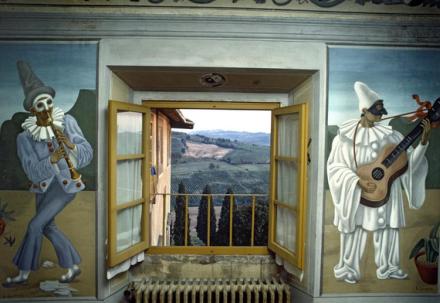
A frescoed room by Gino Severini
at the Castle of Montegufoni, Tuscany, 1984.
Bruno Barbey
via fotojournalismus

Off Pier Head
Viareggio, Italy
Elihu Vedder
b. February 26, 1836
_______________________
Out of the Cradle Endlessly Rocking
Walt Whitman
Out of the cradle endlessly rocking,
Out of the mocking-bird's throat, the musical shuttle,
Out of the Ninth-month midnight,
Over the sterile sands and the fields beyond, where the child
leaving his bed wander'd alone, bareheaded, barefoot,
Down from the shower'd halo,
Up from the mystic play of shadows twining and twisting as
if they were alive,
Out from the patches of briers and blackberries,
From the memories of the bird that chanted to me,
From your memories sad brother, from the fitful risings and
fallings I heard,
From under that yellow half-moon late-risen and swollen as
if with tears,
From those beginning notes of yearning and love there in
the mist,
From the thousand responses of my heart never to cease,
From the myriad thence-arous'd words,
From the word stronger and more delicious than any,
From such as now they start the scene revisiting,
As a flock, twittering, rising, or overhead passing,
Borne hither, ere all eludes me, hurriedly,
A man, yet by these tears a little boy again,
Throwing myself on the sand, confronting the waves,
I, chanter of pains and joys, uniter of here and hereafter,
Taking all hints to use them, but swiftly leaping beyond them,
A reminiscence sing.
...(more)
.....................................................
Word up (PoemTalk #74)
Whitman's 'Out of the Cradle Endlessly Rocking' as performed by Basil Bunting
Amy King, Julia Bloch, and Tom Pickard — before a live audience — joined Al Filreis to discuss Basil Bunting’s 1977 performance of Walt Whitman’s “Out of the Cradle Endlessly Rocking.”
_______________________
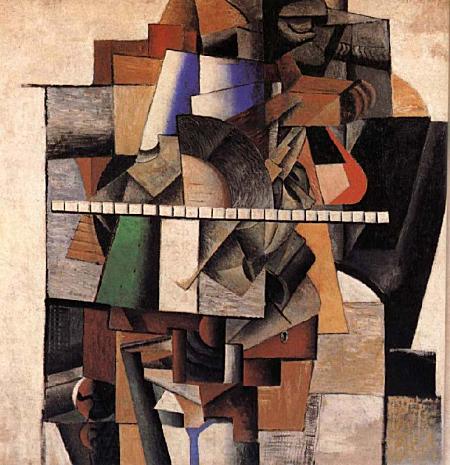
Kasimir Malevich
b. February 23, 1879
_______________________
Agonism, Pluralism, and Contemporary Capitalism
An Interview with William E. Connolly
with Mark Wenman
presented at synthetic_zero
... the other side of the theory is that many of the same forces that create opportunities to extend and heighten pluralism today also intensify the anxieties of those who resent the presence of living counter-examples to their own identities, faiths and household practices. Today pressures to pluralize and to fundamentalize the present encounter each other. This is a struggle that goes on within as well as between us.
(....)
If you treat a theory as a ‘problematic’, consisting of multiple, connected elements with loose ends, remainders and paradoxes, to that extent you see how the master tool of critique advanced by rationalists and dialecticians easily devolves into a mode of self-conceit. To change a theory involves many things, including work on the visceral register of prejudgment that becomes sedimented into as us as we breathe the air, absorb the culture, encounter new events, and experience bouts of suffering, rebuke, praise, and exaltation.
(....)
While I have paid more attention to Deleuze recently, my debt to all three (Foucault, Nietzsche, and Deleuze) is fundamental. Together they advance what I call a philosophy of immanent naturalism, placing it in contention with other philosophies of the day on the ontological, ethical, religious, and political registers. They help to set an ethic of cultivation into competition with the morality of duty; and they provide cues to follow as we enter into the live experiments upon the visceral register such an orientation suggests, both with ourselves through techniques of the self and with and others and ourselves together through micropolitics. Each plays up the visceral register of relational life while refusing to link it authoritatively to a divine injunction.
(....)
Critical responsiveness is the twin of agonistic respect. If agonistic respect speaks to relations between already established constituencies, critical responsiveness is a civic virtue to practice when a movement seeks to move an incipient identity, faith, right, or sense of the good from below the threshold of articulation, legitimacy, and justice onto those registers. ‘Incipient’ here means a pluripotential movement underway, rather than something that is implicit. Critical responsiveness speaks to the politics of becoming or pluralization, during those protean moments when it is in the middle of self-exploration and consolidation. When you are on the initiating side of becoming, your own feeling-imbued ideas and judgments often change as the movement unfolds. When you are on the receiving end you may find some sedimented judgments about nature, biology, morality, the good, rights, or the cultural limits of diversity jostled or disturbed by the new movement. By internalizing a portion of that disturbance you allow the injuries that occasioned the movement, your own assumptions about universality in one or two of the above domains, your presumptive care for the diversity of being, and your concern to redress suffering to reverberate back and forth for a time. On some occasions you may find your thinking about rights or identity loosening up in this way or that, allowing you to admit a new candidate onto the register of legitimacy, even if you yourself do not seek to exercise, say, the new right you embrace. Millions of people go through this ringer from time to time.
...(more)
_______________________
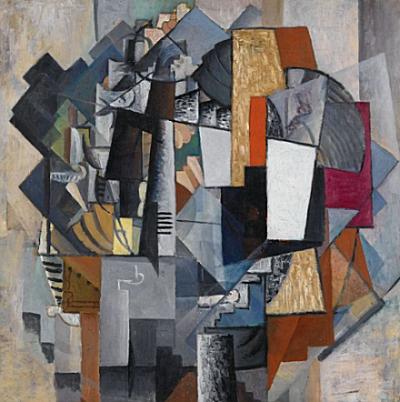
Bureau and Room
Kazimir Malevich
1913
_______________________
The Village: The Seasons
L. E. Sissman
1928-1976
I. January 22, 1932
Could a four-year-old look out of a square sedan
(A Studebaker Six in currency green
With wooden artillery wheels) and see a scene
Of snow, light lavender, landing on deepening blue
Buildings built out of red-violet bricks, and black
Passersby passing by over the widening white
Streets darkening blue, under a thickening white
Sky suddenly undergoing sheer twilight,
And the yellow but whitening streetlights coming on,
And remember it now, though the likelihood is gone
That it ever happened at all, and the Village is gone
That it ever could happen in? Memory, guttering out,
Apparently, finally flares up and banishes doubt.
(....)
IV. July 14, 1951
(....)
To sleep, perchance to dream of winter in
The Village, fat with its full complement
Of refugees returned to their own turf—
Unspringy as it is—in a strong surf
Of retrogressing lemmings, faces fixed
On the unlovely birthplace of their mixed
Emotions, marriages, media, and met-
Aphors. Lord God of hosts, be with them yet.
...(more)
_______________________
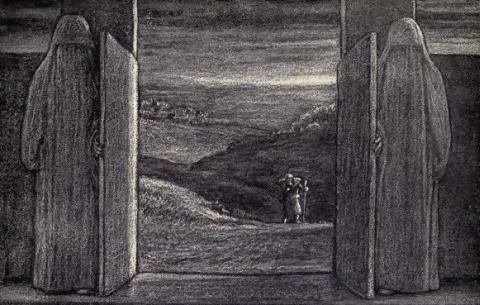
The Ever-Open Door
Elihu Vedder
Illustration from Vedder's book
Doubt and other things
_______________________
Alejandra Pizarnik: from Uncollected Poems (1962-1972)
Translation from Spanish & commentary by Cole Heinowitz
presented by Jerome Rothenberg
On Silence
I.
This little blue doll is my envoy in the world.
An orphan in the garden rain where a lilac-colored bird gobbles lilacs and
a rose-colored bird gobbles roses.
I’m frightened of the grey wolf lurking in the rain.
Whatever you see, whatever can be taken away, is unspeakable.
Words bolt all doors.
I remember rambling through the sycamores …
But I can’t stop the drama—gas fills the chambers of my little doll’s heart.
I lived the impossible, destroyed by the impossible.
Oh, the banality of my evil passions,
enslaved by ancient tenderness.
...(more)
Night, The Poem
If you find your true voice, bring it to the land of the dead. There is kindness in the ashes. And terror in non-identity. A little girl lost in a ruined house, this fortress of my poems.
I write with the blind malice of children pelting a madwoman, like a crow, with stones. No—I don’t write: I open a breach in the dusk so the dead can send messages through.
What is this job of writing? To steer by mirror-light in darkness. To imagine a place known only to me. To sing of distances, to hear the living notes of painted birds on Christmas trees.
My nakedness bathed you in light. You pressed against my body to drive away the great black frost of night.
My words demand the silence of a wasteland.
Some of them have hands that grip my heart the moment they’re written. Some words are doomed like lilacs in a storm. And some are like the precious dead—even if I still prefer to all of them the words for the doll of a sad little girl. ...(more)
_______________________
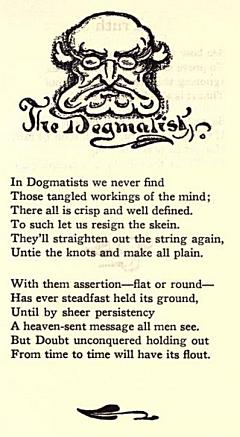
Doubt and other things
Elihu Vedder
(Boston, 1922)
available in many formats at the internet archive

photo - mw
_______________________
What Do We Actually Want Social Media to Do?
Navneet Alang
Hazlitt
What do we actually want social media to do? It’s a testament to how deeply Facebook et al. have penetrated our lives that the question itself sounds strange. To ask “What’s the hot new thing in social media?” sounds reasonable. But less than a decade into its existence, “What do we want social media to do?” already sounds like a question asked by an alien.
It sounds odd, in part, because it presumes we have (or ever even had) a choice. But I ask now because the tea leaves of the Internet seem to be at least temporarily resolving into something clear: we’re about to embark on the next phase of social media. Facebook, Twitter, and others are not only becoming more like each other, but also more similar to the media they sought to replace. Dedicated apps are about to be the new normal, as the many functions of social networks splinter off into smaller chunks. New forms are emerging, from ephemeral messaging to apps just for two . But hovering above it all, another question: what does a world in which social relations are structured by the vision of Silicon Valley actually look like?
...(more)
_______________________
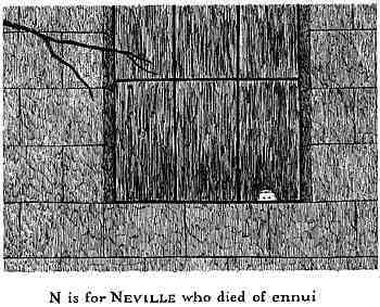
Edward Gorey
b. February 22, 1925
_______________________
Power, Privacy, and the Internet
October 30–31, 2013
Simon Head, director of programs for The New York Review of Books Foundation, addressed the theme of the conference:
The Internet is a transformative technology of our times and it is changing our lives as perhaps nothing else has done since the coming of the telephone, the telegraph, and the mass production automobile a century and more ago. Where the Internet surpasses these earlier technologies is in the speed with which its reach is expanding—in our contacts with one another through Twitter and Facebook, in what we read, hear, and buy; in our dealings with business, government, colleges and schools, and they in their dealings with us. Whether we like it or not we are caught up in these flows of technology and as we are carried along by the flows, some barely visible to us, it becomes increasingly difficult to stand back and distinguish between what is good about these innovations and what is not.
We are pleased to present the following recordings from the event.
_______________________

Durham Cathedral
circa 1865-1895
A. D. White Architectural Photographs
via (OvO)
which has been featuring bridges for the past week or so.
_______________________
Accelerationist Aesthetics:
Necessary Inefficiency in Times of Real Subsumption
Steven Shaviro
e-flux
(....)
Analytic philosophers of mind (...) have spent decades trying to argue that aesthetic experience—or what they more often call “inner sensation,” or the experience of “qualia,” or “consciousness” tout court—doesn’t really exist. As Wittgenstein famously phrased it: “A wheel that can be turned though nothing else moves with it, is not part of the mechanism.” Later thinkers have transformed Wittgenstein’s puzzlement about inner experience into dogmatic denial that it can be anything other than an illusion. But the basic point still stands. Aesthetics marks the strange persistence of what (to quote Wittgenstein again) “is not a Something, but not a Nothing either!”3 Aesthetic experience is not part of any cognitive mechanism—even though it is never encountered apart from such a mechanism.
What is the role of aesthetics, then, today? I said that beauty cannot be subsumed; yet we live in a time when financial mechanisms subsume everything there is. Capitalism has moved from “formal subsumption” to “real subsumption.” These terms, originally coined in passing by Marx, have been taken up and elaborated by thinkers in the Italian Autonomist tradition, most notably Michael Hardt and Antonio Negri. For Marx, it is labor that is “subsumed” under capital. In formal subsumption, capital appropriates, and extracts a surplus from, labor processes that precede capitalism, or that at the very least are not organized by capitalism. In real subsumption, there is no longer any such autonomy; labor itself is directly organized in capitalist terms (think of the factory and the assembly line).
(....)
We have moved from a situation of extrinsic exploitation, in which capital subordinated labor and subjectivity to its purposes, to a situation of intrinsic exploitation, in which capital directly incorporates labor and subjectivity within its own processes.
This means that labor, subjectivity, and social life are no longer “outside” capital and antagonistic to it. Rather, they are immediately produced as parts of it. They cannot resist the depredations of capital, because they are themselves already functions of capital. This is what leads us to speak of such things as “social capital,” “cultural capital,” and “human capital”: as if our knowledge, our abilities, our beliefs, and our desires had only instrumental value, and needed to be invested. Everything we live and do, everything we experience, is quickly reduced to the status of “dead labour, that, vampire-like, only lives by sucking living labour, and lives the more, the more labour it sucks.” Under a regime of real subsumption, every living person is transformed into a capital stock that must not lie fallow, but has to be profitably invested. The individual is assumed—and indeed compelled—to be, as Foucault puts it, “an entrepreneur, an entrepreneur of himself … being for himself his own capital, being for himself his own producer, being for himself the source of [his] earnings.”
...(more)
via I cite_______________________

Ruins of abandoned Russian churches
via Infocult:
Information, Culture, Policy, Education
_______________________
The Exhausted
Gilles Deleuze
translated by Anthony Uhlman
(....)
Exhaustion is altogether different: you combine the set of variables of a situation, provided you renounce all order of preference and all organization of goal, all signification. It is no longer so as to go out or stay in, and you no longer make use of days and nights. You no longer realize, even though you accomplish. In shoes you stay in, in slippers you go out. That does not mean that you fall into indifferentiation, or into the celebrated identified contraries, and you are not passive: you press on, but toward nothing. You were tired by something, but exhausted by nothing. The disjunctions subsist, and the distinction of terms may even be more and more crude, but the disconnected terms assert themselves through their nondecomposable distance, since all they are good for is permutation.Of an event, in general terms, it's enough to say that it is possible, since it does not happen without intermingling with nothing and abolishing the real to which it lays claim. There is only possible existence. It is night, it is not night, it is raining, it is not raining. "Yes, I was my father and I was my son." The disjunction has become inclusive, everything divides, but within itself, and God, who is the ensemble of the possible, intermingles with Nothing, of which each thing is a modification. "[S]imple games that time plays with space, now with these toys, and now with those" (Watt, 71). Beckett's protagonists play with the possible without realizing it; they are too involved with a possibility that is more and more restricted in kind to care about what is still happening. The permutation of "sucking stones" in Molloy is one of the better known texts. Even as early as Murphy the hero gives himself over to the combinatorial [la combinatoire] of five small biscuits, but on condition of having vanquished all preferential order and of having conquered in this way the 120 modes of the total permutability:
Overcome by these perspectives Murphy fell forward on his face in the grass, beside those biscuits of which it could be said as truly as of the stars, that one differed from another, but of which he could not partake in their fullness until he had learnt not to prefer any one to any other. (Murphy, 57)
I would prefer not to [English in original], in the Beckettian formula of Bartleby. All of Beckett's work is pervaded by exhaustive [exhaustives] series, that is to say exhausting [epuisantes], notably Watt, with its series of footwear (sock-stocking, boot-shoe-slipper), or of furniture (tallboy- dressing-table-night-table-washstand, on its feet-on its head-on its face-on its back-on its side, bed-door-window-fire: fifteen thousand arrangements) (Watt, 200-202, 204-206).9 Watt is the great serial novel, where Mr. Knott, with no other need than to be without need, does not reserve any combination for a singular use that would exclude others- whose circumstances are yet to come.
(....) PDF available at -synthetic_zero_______________________

Holy Well Bridge
Miltown Malbay, Co. Clare
ca. 1865-1914
Robert French
1841-1917
The Lawrence Collection
40,000 glass plate negatives
from 1870-1914
_______________________
Linguistic Anxiety and the Deconstruction of the Self in the Realm of the Ridiculous
J.J Phillips
exquisite corpse
(....)
The lodestone of my internal compass instantaneously demagnetized. The fear that I might not be making sense, and that even if I was, my words could summarily be declared gibberish at any time without examination, at the whim of any jerk with an engorged but brittle ego and a sadistic streak, stoked my already considerable anxiety regarding my basic linguistic and cognitive competency, and profoundly destabilized my sense of self to the degree that I was stupefied. When I left his office, I hardly knew which direction to take and my otoliths were so rattled that I couldn’t make my way down the street in a straight line or walk without stumbling. It’s a wonder I found my way home without being hit by a car. This was much more than an attack on my psyche and a semi-public humiliation: he was fucking with some critical areas of my brain, and it was a calculated attack. I couldn’t have been made to feel more stupid and worthless, and he knew it. He set me up and sucker-punched me, and I walked out of his office disoriented and reeling just as sure as if he’d actually slammed me in the solar plexus with his fist.
The fact is that I sometimes have experienced what to me are alarming cognitive and linguistic fluctuations, even disintegration and destruction, to a greater or lesser degree, with consequent destabilization and destruction of my identity; most frequently triggered or exacerbated by external factors on the order of what I describe here. Though my powers of thought and expression are always in need of correction, development and strengthening, and circumscribed by my inherent cognitive and linguistic deficits – if I actually don’t make sense, that’s one thing; but whether by force or by subtler forms of coercion, it’s quite another for someone in the throes of his or her own cognitive-linguistic anxiety and lust to dominate, to act as high priest or priestess of a jealous language g-d of the gap and turn me into my own g*d ambulatory Tower of Babel,4 or strike me mute.
...(more)
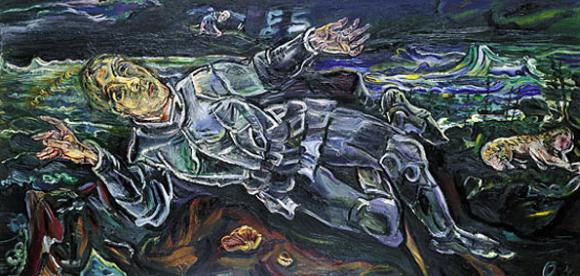
Knight Errant
(Der irrende Ritter)
1915
Oskar Kokoschka
d. February 22, 1980
_______________________
On The Bank
Arseny Tarkovsky
translated from the Russian by Robert Chandler
(....)
......But in all truth
the water’s language was a wonder,
a story of some kind about some thing,
some unchanging thing that seemed
like starlight, like the swift flash of mica,
like a divination of disaster.
And in it was something from childhood,
from not being used to counting life in years,
from what is nameless
and comes at night before you dream,
from the terrible, vegetable
sense of self
of your first season.
That’s how the water was that day,
and its speech was without rhyme or reason.
...(more)
_______________________

Sunrise: A Song of Two Humans
(1927)
F. W. Murnau
Open Culture
_______________________
from
I will look at . . .
Pascale Monnier
Translated from French by John Ashbery
From the forthcoming Collected French Translations: Poetry by John Ashbery
Massachussets Review
I will look at
the sea
through
the windows of my house
as
today
cars
and
I will foresee
storms
tempests
and
the return of the sun
and
I will see
on evenings when the moon is full
in my bedroom
as
in broad daylight
and
those days
even
if
I can’t sleep
I
would be happy
....
via The Page
_______________________

Ken Danby
1940 - 2007
_______________________
Extreme Poverty Has Been Used to Divide and Terrify Working People for Centuries
Frances Fox Piven
excerpted from Imagine Living in a Socialist USA, a new book from HarperCollins edited by Frances Goldin, Debby Smith and Michael Steven Smith
(....)
It seems high time to think about alternatives to the capitalist behemoth. I don’t know whether we will ultimately call the new ways of organizing our society "socialist," but the values that have inspired movements for socialism in the past should inform our search. Those values include a society with sharply reduced inequalities in both material circumstances and social status. Socialist movements also aspire to lessen the grinding toil now imposed on those who work for wages. They dream of an inclusive culture. They fight for democratic practices and policies in which influence is widely shared. And they believe in eliminating the pervasive terror in everyday life that is produced by the exigencies of capitalist markets and the arbitrary power of the state regimes that support those markets.
(....)
Extreme poverty and its institutionalized insults have been used to divide and terrify working people for centuries. Now, with shrinking wages, work becoming more insecure and irregular, and the escalation of the war against unions, extreme poverty has again increased. So have its uses to intimidate the workers who are still managing to stay afloat. This strategy has been boldest in the United States. ...(more)
_______________________
1963-2013: A Civil Rights Retrospective
About Place Journal
a literary journal published by the Black Earth Institute dedicated to re-forging the links between art and spirit, earth and society.
From the assassination of Medgar Evers and the Birmingham Church bombing that killed four children in 1963 to the re-election of the first Black president, this issue contains challenging, provocative, compelling, and prophetic contributions in essays, poetry, lyrics, song, short fiction, photography, art, and video that reflect on a particular or general aspect of the ongoing struggle for civil rights. How far have we come as a country, and how have we regressed?
via Richard Hoffman (Mnemosyne's Memes)
_______________________
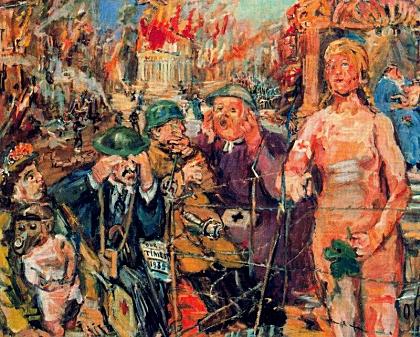
Alice in Wonderland
Oskar Kokoschka

"Breakfast of the Birds"
1934
Gabriele Münter
(19 February 1877 - 19 May 1962)
_______________________
The Stories Of Mavis Gallant
Russell Banks
brick
In a characteristic mingling of modesty and fierce pride, Mavis Gallant has said that “one of the hardest things in the world is to describe what happened next.” It’s hard because of the value- and emotion-laden nature, not just of memory, but of human consciousness itself. Though nothing truly escapes us, memory and mind from the moment of our birth are notoriously, almost hopelessly, selective, elliptical, and inventive. And memory and mind, for expression, perhaps for their very existence, depend upon language—than which, of course, there is no more evasive and deceptive a medium. Now in her eighties, Gallant has spent a long lifetime doing that hardest thing—describing what happened next—in stories that are not only moving and powerful but also true to memory and mind. Born and raised bilingual in French-speaking Quebec and residing most of her adult life in France, Gallant chose to write in English, and in it less than a handful of living story writers are her equal: William Trevor, and Gallant’s countrywoman Alice Munro, perhaps, and—since the death of Eudora Welty—no American that I can think of.
(....)
In Gallant’s stories, the conflicts, obsessions, and concerns—the near-impossibility of gaining personal freedom without inflicting harm on those whom you love and who love you; the difficulty of forgiving a cruel and selfish parent without sentimentalizing him; or the pain of failed renewal—are limned with an affectionate irony and generated by a sincere belief in their ultimate significance, significance not just for the characters who embody them, but for the author and, presumably, the reader as well. Such themes and perspectives as these have characterized the work of the best American story writers of the last half-century, from John Cheever to Raymond Carver to Lorrie Moore, and the best Canadians, from Alice Munro to Margaret Atwood to Clark Blaise. We respond to them on both sides of the long, porous border between our two nations with the same sad shock of self-recognition that we feel contemplating the imagery and atmosphere of a painting by Edward Hopper or a Duke Ellington orchestral suite. There is stringently expressed nostalgia, and then a bite, a redemptive edginess, that by undercutting the nostalgia gives it dignity and makes it worthy of our attention and admiration. As Samuel Beckett noted, “There is no escape from yesterday because yesterday has deformed us, or been deformed by us.” The memory doesn’t simply linger on; it instructs the present and prepares for the future that will sabotage it.
Here is Gallant:
The end of the afternoon had a particular shade of color then, which is not tinted by distance or enhancement but has to do with how streets were lighted. Lamps were still gas, and their soft gradual blooming at dusk made the sky turn a peacock blue that slowly deepened to marine, then indigo. This uneven light falling in blurred pools gave the snow it touched a quality of phosphorescence, beyond which were night shadows in which no one lurked. There were few cars, little sound. A fresh snowfall would lie in the streets in a way that seemed natural. Sidewalks were dangerous, casually sanded; even on busy streets you found traces of the icy slides children’s feet had made. The reddish brown of the stone houses, the curve and slope of the streets, the constantly changing sky were satisfactory in a way I now realize must have been aesthetically comfortable. This is what I saw when I read “city” in a book; I had no means of knowing that “city” one day would also mean drab, filthy, flat, or that city blocks could turn into dull squares without mystery.
- ("Voices Lost in Snow")
...(more)
.....................................................

Mavis Gallant
(11 August 1922 – 18 February 2014)
Mavis Gallant at the Standard, Montréal,
May 1946
(courtesy Library and Archives Canada)
Russell Banks Remembers Mavis Gallant
.....................................................
My Too Little Time With Mavis Gallant
Bert Archer
hazlitt
_______________________
Politics of negativity
innaugural issue of Stasis
A Non-Nullified Nothingness: Walter Benjamin and the Messianic
Sami R. Khatib
absrract
This article discusses Walter Benjamin’s thought-figure of the messianic. Reading his enigmatic “Theological-Political Fragment” (ca. 1921), I argue that the messianic is an inaccessible relation, an unmediated non-relation “in between” the historical and the messianic. Taking my cue from Giorgio Agamben’s reading of messianic time as the remaining time that lies and insists within the “cut of the cut” of the realm of the profane and the messianic, I examine the nature of this messianic “in-between-ness” through Benjamin’s early studies on Hermann Cohen, co-founder of the Marburg school of Neo-Kantianism. It is in Cohen where we can find a philosophical structure that allows us to think the messianic as an a-relation simultaneously separating and connecting the historical order of the profane and the coming of the messianic kingdom (section I). Reading the messianic as an a-relation, I trace back the structure of this separating connection to a messianic nothingness. This non-reflexive “non-nullified nothingness” un-mediates, and, ultimately, short-circuits the historical and the messianic, relating the former to the latter by introducing a minimal cut—an irreducible nothing, a messianic crack—into the order of the profane (section II). If the order of the profane has to be established on the idea of happiness, and the messianic rhythm of this profane order is happiness as the eternal downfall of everything worldly, the task of a truly profane politics is to strive nihilistically for this a-teleological downfall, that is, for the unbinding, the liberation of the messianic nothingness that groundlessly grounds the a-relation of the messianic and the historical (section III). _______________________

Gargantua
1831
Honoré Daumier
b. Feb. 20/26, 1808
_______________________
The existence of absolute poverty today
links assembled by Bookform's Omnivore
_______________________
Allen Ginsberg: “The Ballad of the Skeletons”
Featuring Paul McCartney, Lenny Kaye and Philip Glass
Mercury Records
Music video directed by Gus Van Sant
Marxist Mixtape
PopFront
_______________________
Who's afraid of ruins?
out of the woods
libcom.org
To speak of disaster communism is not to express a preference for a post-apocalyptic style. It is a sober realisation of the irreversible climate change which is being locked-in by present day development. Neither is it to claim that disasters are particularly fertile grounds for communist rupture. It is true that property relations do tend to break down in disasters (self-organised mutual aid is usually labelled 'looting'), and contrary to sensational reports of war of all against all, mutual aid does tend to predominate. But it's hard to claim devastation as a sufficient, or even desirable, basis for a communising insurrection. That's the case even if it does draw class lines, and brings looters into conflict with the state (as with Hurricane Katrina), or provides space for self-organised disaster relief (as with Hurricane Sandy).
Rather, to speak of disaster communism is to recognise the Earth we inherit is one where the ice caps are melting, the glaciers are retreating, the sea levels are rising, the oceans are acidifying, food webs are collapsing, the rate of extinctions is growing, storms are getting stronger, flooding is becoming commonplace, and where agriculture will struggle to adapt to changing climate. It's true that there's no such thing as a natural disaster. Capitalism's pursuit of endless growth is driving climate change. But even if it is overthrown, even if that happens soon, we'll be living with the consequences for centuries, or even millennia. (....)
To speak of disaster communism is to recognise that if communism is to emerge, it will do so in the anthropocene. As capitalism accelerates climate change, ‘possible’ reforms become utopian and ‘impossible’ revolution becomes realistic. We live in strange times. The bourgeoisie is blasting and ruining not just its world, but the Earth systems which sustain human civilisation. We are going to inherit ruins and abandoned cities, there is only the slightest doubt about that. But we still also know how to build, and to build better.
...(more)
_______________________

Häuser Im Schnee
Gabriele Münter 1933

photo - mw
_______________________
Second Hand Life
Martin Edmond
Isinglass
(....)
Ghosts are of course about us all the time; never more so than when we are in the city, which is the home of the dead as much as of the living. On any urban street we walk down they are with us, a horde, an army, a host, all those defunct souls who once walked these streets themselves and are now undone and yet not gone. I hear their voices when I go up to the wine shop or to the tobacconist, the whispering ghosts who once took this very same path for the very same reasons that I do now; and exist, if that is the word, in a state of suspended desire, of unconsummated, indeed unconsummatible, yearning. You cannot help but listen but to respond to the importunities of that grey murmuring mass is to mistake your way; or worse, to lose it altogether. If, without stopping your ears, you can resist their siren songs; if you do not pour for them libations of black blood to drink; if you make your way forthright and undismayed into the admittedly fading light, they will fall back, as they must, those dead, before the single imperative of the living: our futurity.
(....)
The random assemblages you find in second-hand shops—curiosity shops, junk shops, opportunity shops—are analogous to the larger assemblages we find across city streets. Authored by no known hand, the forest of signs yet seems to imply some coherent, if hidden, text; whereas, in a second-hand shop, hasn’t some individual selected what we see before us? Isn’t there some intention? Well, yes and no: selection is probably less the point than mere assembly; and the intention, as with so many of the signs we see abroad in the city, is not to make some statement, imaginative or otherwise; it’s simply to attract a buyer, to invite, provoke, solicit, a purchase or a sale: isn’t it? Any coherence that we might find in such places comes only as a by-product of this commercial imperative; and we understand that these days in our bones. Nevertheless something else is going on as we trawl the streets of the city or go, as we call it, op-shopping: we are like a bricolage artist, constructing from random materials an order that satisfies our own sense of things; a mosaic maker, picking out shards of faience or glass or tile and putting them together to construct an image that carries a meaning, even if that meaning belongs only to one person, who may not themself fully apprehend it.
...(more)
via Jean Vengua
_______________________
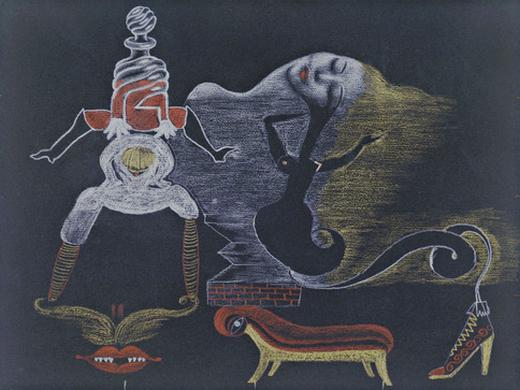
Landscape
Cadavre Exquis
Valentine Hugo, André Breton, Tristan Tzara, Greta Knutson
(c. 1933)
_______________________
André Breton comments on the origination of the cadavre exquis.
exquisite corpse
_______________________
The Spectral Attitudes
André Breton
b. February 19, 1896
trans.,David Gascoyne
I attach no importance to life
I pin not the least of life's butterflies to importance
I do not matter to life
But the branches of salt the white branches
All the shadow bubbles
And the sea-anemones
Come down and breathe within my thoughts
They come from tears that are not mine
From steps I do not take that are steps twice
And of which the sand remembers the flood-tide
The bars are in the cage
And the birds come down from far above to sing before these bars
(....)
The curtains that have never been raised
Float to the windows of houses that are to be built
The beds made of lilies
Slide beneath the lamps of dew
There will come an evening
The nuggets of light become still underneath the blue moss
The hands that tie and untie the knots of love and of air
Keep all their transparency for those who have eyes to see
They see the palms of hands
The crowns in eyes
But the brazier of crown and palms
Can scarcely be lit in the deepest part of the forest
...(more)
_______________________

Poèm Objet
André Breton
1935
_______________________
Epistemic Panic and the Problem of Life
Josephine Berry Slater
mute
(....)
It seems necessary to say straight away that Benjamin was not charging modernity with degeneracy in his lament over the lost art of storytelling:
The art of storytelling is reaching its end because the epic side of truth, wisdom, is dying out. This however is a process that has been going on for a long time. And nothing would be more fatuous than to want to see in it merely a ‘symptom of decay’[…]. It is, rather, only a concomitant symptom of the secular productive forces of history, a concomitant that has quite gradually removed narrative from the realm of living speech and at the same time is making it possible to see a new beauty in what is vanishing.2
Likewise, to speak of the frail body is not to revere it as that to which all reflection must be answerable, nor as the unvarying ledger of perception. It is to draw attention to the question of what the historical intensification of the forces of production makes of our lives, in order to factor this into ideas of accelerating forms of knowledge, or epistemologies, so that we can think what kind of knowing we might trigger in this way, or wish to trigger.
(....)
The shattering of the storyteller into multiple guarantors of facticity is linked to modern democracy’s conversion of the popular body into the basis of sovereignty. The single, divine body of the sovereign is banished and replaced by a collectivity of bodies, represented and unified in the form of a contingent and proxy sovereign. But, as Giorgio Agamben reminds us, it is this very shift to a popular sovereignty based in the multiple lives of the citizens that poses the central aporia of modern democracy: the attempt to vindicate and liberate zoe (or bare life), and ‘to transform its own bare life into a way of life and to find, so to speak, the bios of zoe […] it wants to put freedom and happiness into play in the very place – “bare life” – that marked their subjection.’6 In other words, the bodily life that is the site of suffering, of penance, of control and reproductive labour, that connects us to all living things, is no longer the anathema of politics – that unfettered space in which decisions over what constitutes the good life are made – but becomes both its source of legitimacy and its target of intervention. Finding the bios of zoe, then, is the process by which life is politicised, and taken as a composite material for the production of certain collective, economic, public and national effects and values. Informational verifiability, like the politicisation of life in modern democracy, relies on a shattering and recombination of wholes, whole lives, and the use of life as a guarantor of a meaning or a truth that is decided elsewhere, by a process far vaster than the lives it feeds upon.
...(more)
_______________________
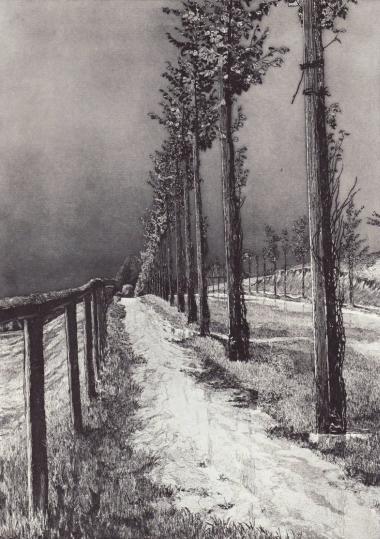
The Road
1883
Max Klinger
b. February 18, 1857

Mount joy Square
Dublin 1967
Evelyn Hofer
_______________________
The Decameron By Giovanni Boccaccio (Trans. Wayne A. Rebhorn).
Reviewed by Steve Donoghue
(....)
It’s a significant failure, since that knockabout side more than anything else made The Decameron the gigantic success it was from its first appearance. The book’s opening gambit is as dark as gambits get: it’s 1348, and Florence is being ravaged by an extremely virulent outbreak of the Black Death—hundreds are dying every day. Seven young women and three young men decide to flee the city for the quiet of villas in the countryside, and there they pass the time by telling each other a series of stories over the course of ten days. Each day has a different master of ceremonies and governing theme, and although there’s plenty of Nichols’s sleek erudition on display, the main uniting theme of the whole getaway is license.
This central fact is understood quite well by Wayne Rebhorn in his excellent new Decameron, a massive and quicksilver volume, beautifully produced, which captures the coruscating mood-shifts of Boccaccio with more contemporary-feeling gusto than any English-language translation has yet managed. The solemnity with which these escaping young people elect their daily leaders is a neat counterbalance to the series of awful, scabrous, bawdy, unspeakable things—as Rebhorn puts it, unpermitted things—that happen in all of these stories, and Rebhorn understands this tidal fluctuation perfectly:
Participating in ritual impacts people, for by stepping outside their ordinary roles and abrogating the rules of society at least temporarily, they enter a liminal space and time that gives them a freedom, a license to engage in all sorts of normally unpermitted behavior. Boccaccio’s young men and women can thus tell stories that have made the Decameron synonymous with witty irreverence, mockery, and sexual license.
(The horror of Rebhorn’s use of such academic buzz-words as “liminal” is strictly limited to his introduction—none of his characters are depraved enough to talk that way—and in any case that horror is counterbalanced by the happy fact that Rebhorn is the first Boccaccio translator in 300 years to understand so clearly that the main thing being celebrated amidst all these fevered couplings is “intelligence in all its forms.”)
...(more)
_______________________
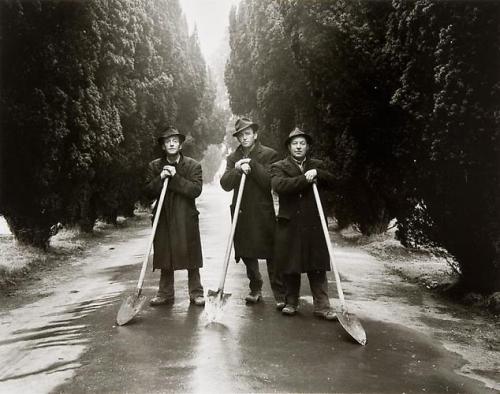
Gravediggers
Dublin, 1966
Evelyn Hofer
1922 - 2009
1 2 3
_______________________
Translation
Jeffrey Morgan
There’s no verb that means to force objectivity on the mutable,
no single adjective to describe how a lager smells
like sawdust and half-gone lilacs. I’m not saying drinking
doesn’t help. I’m saying there’s no language
in which the phrase “many ominous rain clouds becoming one”
best translates into English as hearse. Love is hard enough
and flaccid enough and hard enough again
to assume the pharmacological. Sometimes love is five reds
in front of every rose and forty bucks a dozen.
When my grandfather died, he took the story of our name
with him. Sometimes I think of the dark angels with scissor wings
in Rogier van der Wyden’s triptychs taking that story
from grave to grave like wind. ...
...(more)
anti-
_______________________
Track
Tomas Tranströmer
translated by Robert Bly
2 A.M. moonlight. The train has stopped
out in a field. Far off sparks of light from a town,
flickering coldly on the horizon.
As when a man goes so deep into his dream
he will never remember he was there
when he returns again to his view.
Or when a person goes so deep into a sickness
that his days all become some flickering sparks, a swarm,
feeble and cold on the horizon
The train is entirely motionless.
2 o’clock: strong moonlight, few stars.
.....................................................
Getting close to Tomas Tranströmer
Mark Thwaite
ReadySteadyBlog
(....)
I'm not sure I understand the concept of 'closeness' in Tranströmer's poems, but I'm threatened by it. Threatened that the man whose "broad hat leaves his face in shadow", or the houses that might steal closer to mine in the middle of the night, know more about my sickness than I do. Like "a man [who] goes so deep into his dream / he will never remember he was there / when he returns again to his room" (Track).
In Kyrie Tranströmer writes "At times my life suddenly opens its eyes in the dark." When this happens, what do you see? Darkness. A darkness, perhaps, not as jet as when your eyes are closed. If you are lucky. What, then, do you know? That you are not alone; that what you see is not all there is. That you are not alone and that the knowledge is no comfort. Knowledge, it would seem, is simply knowing that the threat has come just that little bit closer.
...(more)
.....................................................
After a Death
Tomas Tranströmer
Once there was a shock
that left behind a long, shimmering comet tail.
It keeps us inside. It makes the TV pictures snowy.
It settles in cold drops on the telephone wires.
One can still go slowly on skis in the winter sun
through brush where a few leaves hang on.
They resemble pages torn from old telephone directories.
Names swallowed by the cold.
It is still beautiful to hear the heart beat
but often the shadow seems more real than the body.
The samurai looks insignificant
beside his armor of black dragon scales.
Ten poems by Tomas Tranströmertranslated by Robert Bly _______________________

Winter Still Life
1956
William Scott
(15 February 1913 – 28 December 1989)
_______________________
Developing a presentation given at the Accelerationism symposium in Berlin December 2013, Ray Brassier draws upon the divergent theories of 'accelerationism' and 'communisation' whose mutual illumination exposes the problems of articulating cognitive abstraction and social practice
Wandering Abstraction
Ray Brassier metamute
‘Accelerationism’ excites passionate condemnation and equally fervent affirmation. Perhaps this is because what is at stake in this ‘Marxist heresy’ is our relation to the future: is communism, understood as ‘the real movement which abolishes the present state of things’. Is the consummation of Enlightenment understood as humanity’s emancipation from its ‘self-incurred tutelage?’ Or is communism rather the repudiation of an Enlightenment modernity that is nothing but an alibi for the despotism of capital? The version of accelerationism recently proposed by Nick Srnicek and Alex Williams affirms the former by reasserting the Enlightenment – and classical Marxist – compact between emancipation and rationality. This new, ‘rationalist’ accelerationism is intended as a corrective to the vitalist proclivities of its post-structuralist predecessors, best epitomised by Deleuze & Guattari's Anti-Oedipus, in which political agency was hitched to an Aeolian processes of deterritorialisation and emancipation was propelled by the metaphysics of desiring-production. Srnicek and Williams’ attempt to decouple accelerationism from vitalist metaphysics requires distinguishing between epistemic and political acceleration as indexes of conceptual and social abstraction respectively. It is the conjunction of the latter pairing that their proposal seeks to articulate. Thus the issue of abstraction, and of its epistemic, social, and political valences, turns out to be central to their reformulation. Of course, Srnicek and Williams’ suggestion that the feedback between social and conceptual abstraction might play a positive emancipatory role is controversial. So how are we to understand the relation between these two registers of abstraction?
...(more)
via —synthetic_zero
|

































